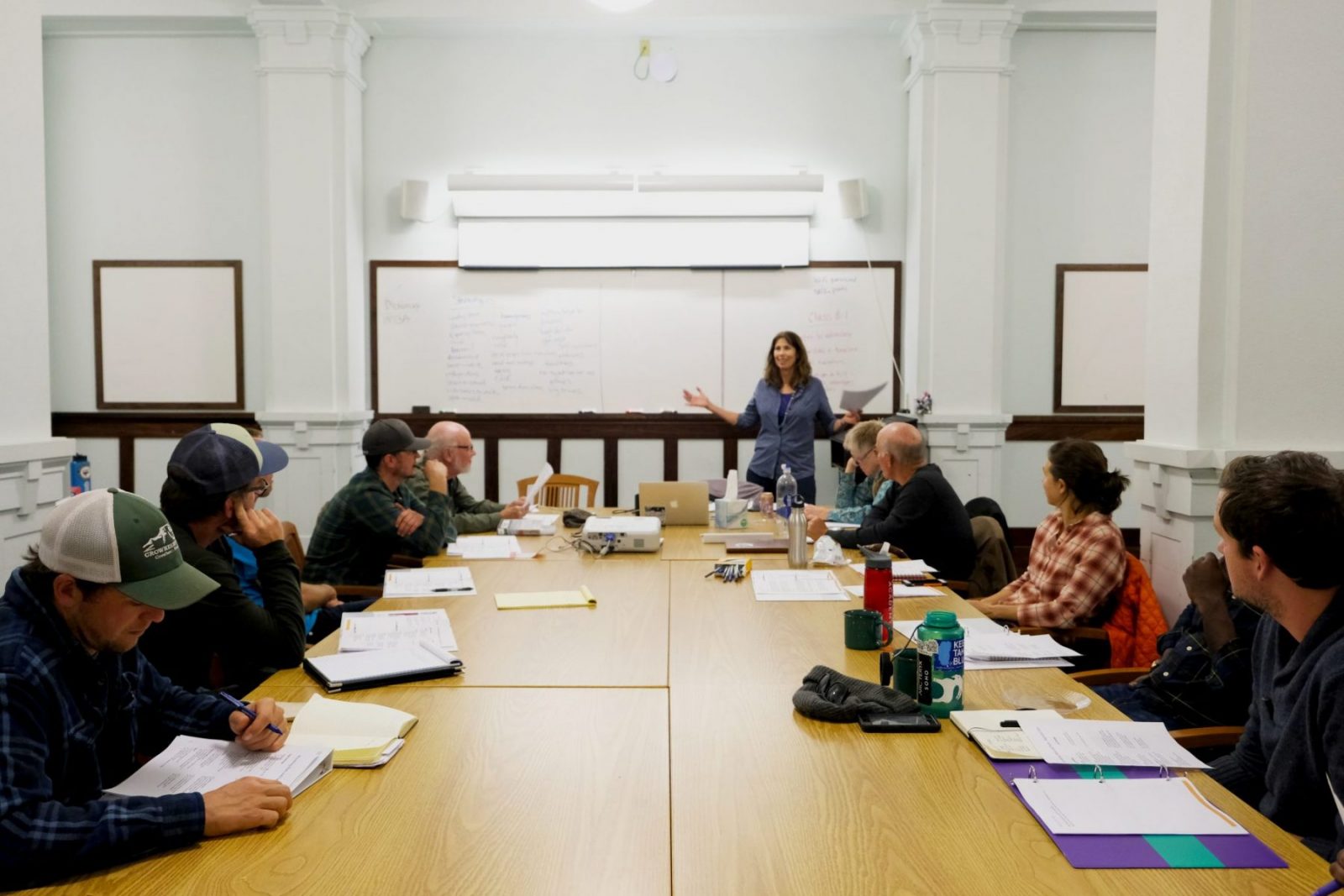[et_pb_section fb_built=”1″ _builder_version=”3.19.9″ background_color=”#ffffff”][et_pb_row _builder_version=”3.19.9″ background_color=”#ffffff” background_size=”initial” background_position=”top_left” background_repeat=”repeat”][et_pb_column type=”4_4″ _builder_version=”3.0.47″ parallax=”off” parallax_method=”on”][et_pb_text _builder_version=”3.19.9″ background_size=”initial” background_position=”top_left” background_repeat=”repeat”]
Citizen advocates converge for WOC’s inaugural Conservation Leadership Institute
On a November evening at the Lander Library, Mike Burd, a sportsman and trona miner from Green River, spoke to a group of 17 students about the value of partnerships. More than a decade ago, when labor union leaders sat down with hunters and conservationists to discuss potential oil and gas development in the Wyoming Range, they all agreed about the need to protect this special area.
“We all wanted a clean environment, safe places to live, and some places set aside from development,” he said. Despite having wildly different backgrounds and experiences, the key to success, Mike suggested, was finding common ground.
For the students, his advice wasn’t just conceptual. This was a session of the Wyoming Outdoor Council’s first Conservation Leadership Institute, a free eight-week course designed to introduce aspiring grassroots leaders to the tools of organizing, and to help build stronger connections with one another.
History and goals
WOC’s CLI was modeled on a program created by the Jackson Hole Conservation Alliance. We tailored the program for Fremont County, bringing in experienced Eastern Shoshone and Northern Arapaho tribal leaders as speakers, recruiting a variety of conservation and outdoor recreation stakeholders in the region, and distilling lessons from advocacy practices from around the state. CLI introduces emerging advocates to the basics of organizing, from leading a successful meeting to crafting a letter to the editor, and emphasizes community and relationship building, especially within the group.
Our syllabus was made up of eight action-packed weeks covering everything from Wyoming’s election laws to effective communications. We also asked each student to workshop a project to test concepts learned in class.
WOC’s first CLI class
Lander was ready for a program like CLI — the class filled in a matter of days. The 17 students who enrolled represented a range of experiences, backgrounds, ages, and connections to Wyoming. Some students were new to Lander and wanted to meet like-minded community members; others had deep Wyoming roots and wanted to build skills to support their passions. Their diversity is evident in their array of projects (see some examples on page 9).
The eight weeks were packed with guest speakers and information — covering everything from how to run a Facebook page to tips for approaching legislators about a policy issue.
Guests, too, represented a range of experiences, coming from groups such as the Wyoming Education Association, The Wilderness Society, and the Wyoming Trial Lawyers Association. There was plenty of opportunity for fun, too. Students practiced short, fast pitches before experienced Wyoming lobbyists and learned the basics of campaign planning through a Lord of the Rings framework. (“One does not simply walk into Mordor.” Before setting off to reach a goal, you must analyze the landscape, gather allies, and make a plan of approach.)
One success of CLI 2018 was the connections students made with one another. Their mutual support and friendships will strengthen their projects and their communities into the future. To us, that’s the most valuable lesson: advocacy in Wyoming is all about building relationships and finding common ground.
Interested in CLI? We’re planning for 2019! Email Kristen Gunther —
kristen@wyomingoutdoorcouncil.org.
Image: Claire Cella
[/et_pb_text][et_pb_blurb title=”Student Spotlight” admin_label=”Student Spotlight” _builder_version=”3.19.9″ header_level=”h3″ header_font=”|||on|||||” header_text_color=”#fff5e7″ header_font_size=”20″ header_line_height=”1.1em” header_text_shadow_style=”preset1″ body_text_color=”#fff5e7″ background_color=”#007ea9″ custom_padding=”25px||15px|”]
Wade Lippincott, who owns a roofing company and lives in Thermopolis, is forming a collaborative group to conduct recreational planning and development in Hot Springs County.
Eryn Pierce, NOLS’s art director, is building a grassroots network of local artists to volunteer time to advocacy or nonprofit groups in Fremont County.
Skyler Dixey, executive director of the Wind River Native Advocacy Center, wants to enhance the effectiveness of the group’s outreach and programs.
Aaron Foster, district supervisor of Fremont County Weed and Pest, wants to improve local participation in the “Play, Clean, Go” campaign to reduce the spread of noxious weeds.
Luke Stacy, a Creative Energies employee, is volunteering with the Wyoming Wildlife Federation to expand their Hunters for the Hungry food donation program.
[/et_pb_blurb][/et_pb_column][/et_pb_row][/et_pb_section]

